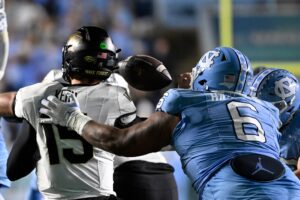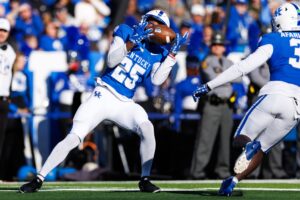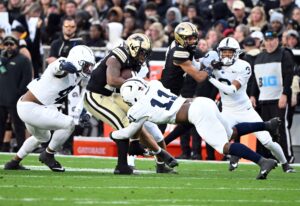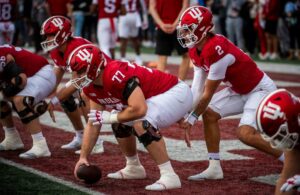In an unprecedented move in College Football, the University of Tennessee backed out of hiring Ohio State defensive coordinator Greg Schiano on Sunday due to an overwhelming outcry from their own fan base. It was one of the most surreal days in the history of the sport.
Rocky Top Revolt: The Real Story
The story of the Rocky Top Revolt is long and complex. It’s more than disgruntled fans unhappy with the selection of Schiano as head coach. It is about years of dysfunction in the administration of the athletic program, both leaders and boosters. It’s about eroding quality, hypocrisy, and cronyism in sports journalism. And it’s about the power of social media — and how that threatens the aforementioned sports journalism profession.
To dismiss this fan uprising as uneducated fans having undue influence on a coaching search is both ill-informed and short-sighted. We take a four-part look at everything that happened on Sunday, and why. We also look at the implications.
In Part 1 of our series Wednesday, we focused on Greg Schiano and his very average coaching history. While Schiano was the central figure in Sunday’s drama, he wasn’t the antagonist.
In Part 2 of our series, we examined the Tennessee administration’s role as the true antagonists and the object of than fans’ ire. The outrage on Sunday wasn’t really directed at Schiano, it was towards complete administrative malpractice by Tennessee’s hired leadership.
In today’s Part 3, we look at the curious media reaction to Sunday’s action. The coverage and commentary were almost laughable at times and certainly biased and unprofessional throughout. We will also discuss what this event tells us about both the declining quality of national-level college football media coverage and the impact of social media on today’s landscape.
Part 3: A False Narrative
Call it the tweet that sparked a revolt. When USA Today’s Dan Wolken broke the story that Tennessee was set to hire Ohio State’s Greg Schiano last Sunday, it sparked an unprecedented social media backlash from fans that included Tennessee state political leaders and local businesses. It also ignited a curious fierce back-and-forth between media members with a national voice and the regional voices of Tennessee fans and Knoxville media. These reactions and competing narratives signal some important observations and lessons learned about the national media and the contemporary sports journalism environment.
Tennessee is finalizing the deal with Schiano. Hopes to name him later today, per person with direct knowledge.
— Dan Wolken (@DanWolken) November 26, 2017
Competing Narratives
We covered Schiano’s resume in Part 1 of our series. While we won’t go in depth on the Schiano file in this segment, it is important to point out a few things. Let’s be clear — we are evaluating Schiano simply on his coaching performance. We don’t know the man personally; he might be a great guy to hang out with and is very likely a good person just like you or me.. This is strictly about his professional performance.
The Schiano Record (A Recap of Part 1)
First, Schiano did resurrect a doormat Rutgers program to a team that was average to slightly-above-average in an extremely weak Big East conference. Schiano had one highly successful season at Rutgers and that’s what he’s hung his professional hat on since. You can make the argument that he’s a great defensive coordinator, although you can also make a similarly strong argument that he’s merely a good defensive coordinator. In the end, Schiano’s professional resume indicates that he’s a quality Power 5 defensive coordinator, like John Chavis or Kevin Steele. He was an abject failure in the NFL as a head coach. That segues into the second point.
He had some serious friction with a lot of people in the football world, especially in the NFL. This is the same coach that called blitzes on Victory formations, got into very public beefs with Tom Coughlin and Peyton Manning among others, was investigated by the NFL Player’s Association for speaking publicly about Josh Freemen’s status, had a toxic relationship with Freemen himself, and was so disliked by his Tampa Bay players that they almost mutinied on him.
Lastly, and the elephant in the room, was his tangential connection to the Jerry Sandusky scandal. There’s certainly an argument to be made that the Mike McQueary testimony unfairly burdens Schiano with a bad character reputation. But the national media that so fervently came to Schiano’s defense missed three key points here.
First, it wasn’t the Tennessee fan base that made that allegation. If Schiano’s character was smeared, it was by McQueary in his sworn testimony. Volunteer fans weren’t trying a new case against Schiano based on that evidence, they were simply highlighting the fact that it was a poor decision by program leadership to bring in someone that has that type of testimony against him. Second, Tennessee fans weren’t necessarily angry with Schiano — they couldn’t care less if he continues to coach at Ohio State or elsewhere. Their frustration, as discussed in Part 2, was directed towards John Currie and Jimmy Haslam.
With the very average resume, the demonstrated difficulties with working relationships, and the connection to Sandusky — as tangential as it is — there’s really not a way you can make an argument that Schiano should have even received a call from Currie.
The National Narrative
However, that didn’t stop some prominent voices from quickly coming to the defense of Schiano and then directing their analysis towards the Tennessee fan base. Here’s a sample and summation of the Schiano supporters:
Chris Carlin, from the New York and New Jersey area, where Schiano is from, tells Vols fans that they’re dumb. Doesn’t really tell us why he’s great, other than he coached Rutgers to a few wins.
Schiano to Tennessee was very predictable. Great spot for him. The guy is a program builder. If you think it’s a bad hire, you don’t know college football.
— Chris Carlin (@ChrisCarlin) November 26, 2017
Wolken, who broke the story, acknowledges that Tennessee fans will hate the hire. He thinks Schiano is a very good coach. But why?
If Currie can convince Schiano to take the job, it’s a home run. Tennessee fans will hate it. I think he is a very good college coach.
— Dan Wolken (@DanWolken) November 26, 2017
Dan Wetzel, of Yahoo Sports, who covered the Sandusky trial, doesn’t understand why Tennessee fans aren’t happy with a coach that lost to New Hampshire and had a 28-48 conference record in what was essentially a Group-of-Five conference. He does take a shot at Tennessee fans, though. He never explains, or reports, to Tennessee fans why they shouldn’t be upset with the Schiano hire. While two nine-win seasons and three straight New Year’s days bowl wins coming into 2017 isn’t where Tennessee fans want to be, I wouldn’t quite say it’s “hasn’t been good in a long time.”
Don’t understand the anti-Greg Schiano sentiment at Tennessee, except it might explain why Tennessee hasn’t been good in a long time.
— Dan Wetzel (@DanWetzel) November 26, 2017
Joel Klatt of Fox Sports, describes Vol fans as “emotional hypocrites with a severe lack of football knowledge.” Basically calling Tennessee fans emotionally unstable and dumb. Still no explanation of why they might be wrong. Klatt continues to rail against the ignorance of Tennessee fans.
Tennessee is now having to focus on coaches with “Tennessee ties” because no one else will touch that job with a ten foot pole…You were led by emotional hypocrites with a severe lack of football knowledge that incited an internet mob…you made your bed, now go to sleep!
— Joel Klatt (@joelklatt) November 27, 2017
Dennis Dodd of CBS Sports, is pushing the “Tennessee should settle for what they just fired” narrative. Why would Tennessee fans want a coach they think could make them better than “who they are?” And talks, again, about the emotional instability of Vols fans. Those Vols fans are awfully dumb. The joke was on Dodd, though, as his “Bubba from Pidgeon Forge” slur of Volunteer fans (on the one year anniversary of the devastating wildfires in Pigeon Forge) misspelled the town of Pigeon Forge. That tweet, of course, has since been deleted.
Tennessee issue started with a dearth of home-run hires this silly season. Ruth’s Chris ran out of filets in Knoxville. That and UT not realizing who it is.
— Dennis Dodd (@dennisdoddcbs) November 27, 2017
ESPN’s Kirk Herbstreit, who knows Vols fans because he lives in Tennessee, points out that Tennessee is 86-77 in the last 13 years. So why would they want a coach that was 68-67 in 11 seasons in a much, much weaker conference? Again — why would he be such a great hire? Dumb Vol fans.
Been traveling all day back from ND/Stanford game last pm. Hearing some @Vol_Football fans upset about Schiano hire!? Why? You know what the Vols record is last 13 YEARS is?? 86-77!! A little better than 6-6 avg! I think he is a GREAT hire to bring you back! Get behind him!!
— Kirk Herbstreit (@KirkHerbstreit) November 26, 2017
And the Coup de Grace of the national media narrative was Tim Brando, of Fox Sports. Brando has repeatedly berated fans for being dumb. He lauded both the Derek Dooley and Butch Jones hires and used them to point out that Tennessee fans really have no clue about football. Then, Brando goes after local radio host Tony Basilio, calling him a lunatic and a “disguised media” member.
Only thing worse than an irate CFB fan during the firing/hiring crazy season? A fan disguised as media with a legitimate microphone going out over legitimate AM/FM airwaves screaming like a lunatic. Sadly, it happens all the time.
— Tim Brando (@TimBrando) November 26, 2017
Of course, each one of these personalities is far more accomplished in their fields than you or I. But, that doesn’t mean that they aren’t above reproach or can’t be wrong. And there’s plenty of discussion to be had on the merits of Sunday’s actions. But by-and-large, the national media completely whiffed on their commentary of the Rocky Top Revolt.
Local Narrative
The local narrative was quite different. While the national media was focused on Schiano and the wrongdoings being done to such a quality person, the local media were focused on addressing the heart of the story: a failing Tennessee administration. Schiano was only a symbolic central figure in a drama that was ten years in the making.
For the national media, this was a great way to fill the 24-hour news cycle. For the local Knoxville media, this was the culmination of a decade’s worth of frustration with administration antics and ineptitude.
The striking difference between the externally-focused national narrative and the internally-focused local narrative is the clearest example the disconnect with the national media outlets.
Common Themes
There are a couple of common themes here.
A Bit Outside
First, all of the national media voices are completely missing the bigger story. The story of the Rocky Top Revolt was that a fan movement — directed inward, at their own administration — caused meaningful change that was to the betterment of the program. It had nothing to do with Jon Gruden. Yes, certainly it was a tough day for Greg Schiano and his family. There’s no denying that. But if you’re applying for a job that’s going to pay you $5 million a year, you should be able to stand up to scrutiny. This story — that a fan base forced their administration to scrap what was to be a horrendous hire — is a compelling and historic story. And many of the national media (Andy Staples excluded) missed this incredible story.
No Explanations
In the new world order of 280 characters, one would think that the acrimony of some of the media twitter commentary would shift from condemnation and derisiveness of the common fan to explanation or enlightenment. So far, the three compelling justifications for why Tennessee fans should have accepted the Schiano hire are:
- Built Rutgers program (to an average Big East Program)
- Family, friends, Meyer, and Belichick all say he’s a good guy
- No evidence supporting McQueary’s grand jury testimony
That’s about the extent of the education of the dumb Tennessee fan base. It equates to ‘you should believe me because I’m on television’ argument.
Talking Down To Fans
The next common theme is how dumb Tennessee fans are. And this isn’t just the Tennessee fan base. The elitist mentality for national media voices to talk down to fan bases across the country continues to grow. This is a by-product of the social media age. We’ll address that shortly.
This should come as no surprise, however. When Butch Jones made remarks critical of the media’s coverage of his team, both the local and the national media blatantly mocked Jones at every opportunity. Of course Jones had worn out his welcome in Knoxville, so the fans felt as though it was part of the process to get rid of their coach. Rece Davis was especially critical and cynical on that weekend’s Gameday in a segment that was akin to the infamous “Cupcakes on the Sideline” segment during a Washington Huskies game earlier this season. It’s no wonder that ESPN just announced a third round of layoffs this year. Why would people want to watch programming that tries to convince them of their own failings and ignorance?
The State Of Contemporary Sport Journalism
In the age before the internet, beat reporters and national columnists were the only real means by which a college fan could get insight and information about his or her favorite team. The emergence of the digital age and social media have fundamentally transformed sports journalism.
Relegation Of The Journalist To Entertainer
In today’s modern information environment, individual schools control more and more of the creation and distribution of their branded content. They can connect directly to fans via youtube channels, in-house studios and marketing teams, and social media platforms like Twitter and Snapchat. The sports journalist is becoming increasingly less important to sports fan. Rather than news and information, they have to command advertiser dollars by being entertainers. Instead of reporting the story (“In A First, Tennessee Fans Force Administration Into Decision”), they become the story (“I believe he’s a great coach” or “I can’t believe Bubba from (sic) Pidgeon Force can sway a hire”). To the contemporary sports journalist, all too often, it’s about how to make the story about them.
The Ties That Bind
It’s also important to remember that the distance between journalist/reporter/entertainer and the subjects they cover is almost non-existent any more. With more and more ex-players and ex-coaches joining the sidelines, booth, and studios, the personal relationships often times trump honest and frank commentary. It was evident in the Schiano narratives that the driving force was not football related.
It’s also interesting that many of the personalities strongly advocating in Schiano’s defense share the same agent — uber-agent Jimmy Sexton. That includes Herbstreit, Desmond Howard, and Stephan A. Smith. Of course it benefits them to see Schiano move into a head coaching position and do well if they are on the same management team. This industry-versus-consumer mindset leads to another growing problem.
Out Of Touch With Regional and Local Sports
Another national narrative was the angst towards the local Knoxville media, almost all of whom covered the Rocky Top Revolt from the fan’s perspective. When I talked to one prominent member of the Knoxville media, he said this was likely because the local media seemed to side with the fans, rather than “yield to those in power.” Many national media members must cultivate relationships with schools and influential people to maintain that last vestige of the pre-internet sports age discussed above. They cling to these relationships to have that “insider knowledge” or those “sources.”
But with the proliferation of websites and blogs (this one notwithstanding), the coverage of college football is trending back to where it began: regionally. It shouldn’t be a stretch to believe that the Knoxville media or the Austin media or the Los Angeles local media are more tied into the programs they cover. Moreover, as these national media voices continue to evolve into entertainers, their time is tied up more and more with building personal brands. Sportscenter commercials, this radio show, that television spot, advertiser and sponsorship requirements. For every hour they spend on television or radio, or radio that’s televised (why is that a thing?), that’s an hour they aren’t reading, researching, studying, or talking to people.
And with programs continuing to grow and grow, and more programs maturing into quality teams with larger and larger fan bases, it’s hard for a national media member to keep track of everything.
The Real Story
There are two compelling stories that came out of Sunday’s drama.
The Fan Base Speaks
The first, as mentioned, is how a college football fan base forced decisive and immediate change of a significant administrative action. Part 2 of this series talked about the decade of ineptitude that led up to the boiling point.
There is certainly a conversation to be had regarding the ramifications of this movement, particularly the negative secondary effects on Schiano.
But to shape the narrative solely on Schiano completely misses the real story. Never before in college football has a fan base been so ruthlessly effective in forcing such a quick and decisive change of a high-level administrative action. It truly was a historic day in college football. This story alone is worth a book unto itself.
The Divide Between Media and Fans
The other story from last Sunday is the evidence of the clear disconnect between media and fan. If fans are so dumb and the second worst thing in the world, behind only “fake” local media, as Brando suggests, then why do national media outlets and reporters continue to provide content. Certainly, according to Brando, it’s not for their pleasure. And as illustrated above, there’s not much enlightenment or education in the mass of social media discussion. So if it’s not for pleasure, professional fulfillment, or in service of the fans, it must be for personal gain.
And that’s fine. This is America. Where the whims of the market rule — unless of course you’re in a local market threatening the establishment. And where a plurality of ideas and an open and frank discourse sharpens our collective intellect — unless of course you’re going against those that know. A place where merit and achievement are the driving force for advancement — unless of course your a great guy or the Athletics Director at Tennessee. Maybe those are false narratives as well.
But hey, what do I know?
Photo Credit:
Embed from Getty Images






